
Stigmas linked to incontinence and menstruation still cause social isolation and inactivity, preventing people from participating fully in society and resulting in the loss of millions of work and school days every year. However, good opportunities still exist to improve handwashing routines. More can also be done to nudge young people to be more considerate as the pandemic rolls on. These are some of the observations in Essity’s biennial Essentials Initiative Survey 2020-2021.
In the survey, Essity examined the connection between health, hygiene, and people’s well-being by talking to 15,000 participants in 15 different countries. The survey covered the topics of incontinence, menstruation, age differences, public health, public hygiene and sustainability. A special interest is taken in researching stigmas and taboos.
“Social stigmas around especially incontinence and menstruation unfortunately lead to many avoiding social activities and isolating themselves. The survey results clearly show that there is a great deal left to do to break barriers to well-being, and that we need to broaden awareness of solutions that are actually effective and can improve people’s daily life,” said Joséphine Edwall-Björklund, senior vice president of communication at Essity.
The 2020-2021 survey also identified where there is potential to improve attitudes and hygiene behaviors with regard to COVID-19.
“For many years we have educated about the importance of proper handwashing, something that is more important than ever. Along with our partners, we will maintain our focus on providing education on the importance of hand hygiene and ensuring that, especially young people, adopt good hand hygiene practices at an early stage. This is a good way to reduce the spread of the coronavirus and other infections,” said Edwall-Björklund.
Excerpts from the survey include:
- Forty-two percent of women have refrained from going to work or school because of matters connected to menstruation.
- One in three of those that have refrained from going to work or school due to menstruation say it’s because they lack access to clean and safe toilets.
- One in three that miss school or work due to menstruation do so because of social stigma.
- Thirty-eight percent of people suffering from incontinence refrain from using public transport.
- Eighty-seven percent refrain from using a public toilet, 43 percent of which do so because the facility lacked toilet paper or soap.

 The Down and Dirty on Cleaning in Virus Season
The Down and Dirty on Cleaning in Virus Season How Surfactant Use is Expanding in Commercial Cleaning
How Surfactant Use is Expanding in Commercial Cleaning Operational Excellence Series 2025: Better Budgeting
Operational Excellence Series 2025: Better Budgeting